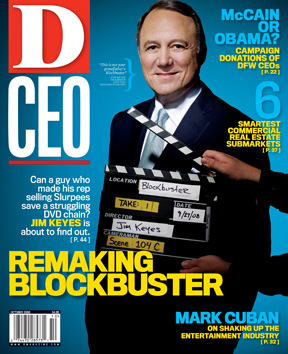Chrysler’s Lee Iacocca did it. Here in Dallas, Christine Cook of Sleep Experts and Rick Stacy of Stacy Furniture are doing it, too. The question, though, is whether CEOs should play starring roles in their company’s advertisements to begin with.
“It depends on what they’re trying to accomplish,” says Stan Richards, founder of the Dallas-based Richards Group and one of the country’s most respected advertising executives.
Stacy Furniture ads convey that the company is local and that you’ll get a good deal there, Richards says. “Production values aren’t a concern,” he adds. In fact, “the less expensive they look, the better.”
Clearly, Stacy and Cook are not experienced TV presenters. Their voices are loud and their copy is basic. However, not everyone has to be polished like Iacocca. Wendy’s founder “Dave Thomas was effective because you came away with the idea that this is a guy who cares a lot about the quality of the product,” Richards says. “He was terrible on TV, but what came across was sincerity.”
Even so, being competent doesn’t necessarily mean the spokesman-CEO will be successful. Richards points to current TV ads for Sprint featuring Dan Hesse, the company’s CEO. “He’s a good spokesperson, and he’s trying to communicate that we have the wrong impression of Sprint—that it may not be doing well, but that he’s going to turn it around,” Richards says.
Sprint’s message may not be dramatic enough. Iacocca, by contrast, had a bold purpose, Richards says. It was “to signal a major change in the direction for the company of how cars were designed and built. That fit his personality of a driven guy who would accept no excuses. It was highly effective.”
Even if the CEO is highly effective, there’s the risk of what happens if he or she is fired. That’s what happened last spring to a bank in Hawaii. Its CEO—who was a hit in ads with Alex, the bank’s “loyalty dog”—got bounced after the bank lost money in the subprime mess. That was the end of Alex. Or, what if the CEO moves to a rival? That happened to a bank in Nevada whose CEO appeared in successful ads for eight years, then moved to a competitor and began appearing in its ads.
We’re talking, of course, about regular ads that sell products or services—not “crisis” ads, where it’s almost expected that the CEO will appear. But even in crisis ads, Richards says, the CEO is not always the smartest choice. Critics widely panned Ford’s ads with then-CEO Jacques Nasser following the Ford-Firestone-Bridgestone exploding tire controversy. Wrote Stuart Elliott, the advertising writer for The New York Times: “Nasser comes across as an unfortunate combination of Al Gore and Crocodile Dundee.”
Advises Richards: “Listen to your outside advertising people. … Whether it’s improving traffic or changing the perception of a product or service, there are many ways to deal with challenges effectively without having to expose the CEO.”
Richards’ favorite ads, by the way, are his wildly successful “Eat Mor Chikin” spots for Chick-fil-A. So, when your friends or PR people tell you, “You ought to be in ads,” tell them you can be replaced by cows that can’t spell.
by Merrie Spaeth
WHEN IT ALL HITS THE FAN …
Ken Fairchild, who has coached numerous CEOs—as well as George H.W. Bush, George W. Bush, and Ross Perot on their presidential runs—offers the following commandments for execs who have to speak to shareholders or the media. Fairchild owns Fairchild Consulting, a media and political crisis consulting firm based in Dallas.
THOU SHALT NOT:
Think that your title will shield you from tough questions. “The CEO … will come back from an interview and think, ‘How dare they ask me these questions?’ ” Fairchild says. As a result, CEOs might not be prepared to answer the inevitable toughies.
Avoid the hard questions. Fairchild said direct questions deserve direct answers; otherwise, CEOs can come off like politicians. If the answer makes the company look bad, make the reply short and move on. Elaborate if the answer makes the company look good.
Forget to set the ground rules before fielding questions. “If you can’t answer a question (under advice from attorneys), you’ve got to be able to say why. Does that mean a reporter’s not going to ask it? No, but you’ve set the rules in advance.”
Stand in front of a disaster scene and give a TV interview. As the subject of a TV interview, you can pick where and when you’re interviewed. So, it makes sense that, if you’re the CEO of an airline, there isn’t a 737 ablaze in the background.
Overdress. Don’t be the only one in a coat and tie at the company barbecue. Dress one notch above everybody else; if most people are wearing shorts, wear jeans. But leave the cutoffs at home.
Appear too rehearsed. Media-savvy consumers can smell insincerity a mile away. But they’re just as quick to buy enthusiasm from someone who believes in what he or she is saying.
by Dave Moore





